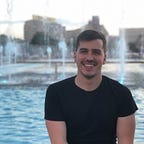Hearing only one side will make you blind
I have this post in my head for a long time now, but recently seeing the trailer of the new Fed Up documentary made me finally write it.
Fed up talks about some of the gimmicks inside the food industry, and how what we once thought it was ok for our health is now considered a considerable demon (sugar). But this post isn’t about food, gimmicks, or any documentary of this kind. This post is about how easy it is to accept a biased opinion, and how deeply that affects our lives.
We all have our opinions about a big range of topics — every now and then we argue about things such as: that astrology works, gay couples should be able to adopt, or that the Paleo diet is the best one for our health, just give a few random examples. When someone ask us why, we tell them that’s because we’ve read about it in some articles, a friend told us, or because that’s what we learned in college. And actually, that’s reasonable; specially when most of the time we have some pretty good arguments to prove our side.
But if someone ask us if we read or heard someone endorsing the opposite — that Paleo is bad, gays shouldn’t adopt, or that astrology is fake — most of us will answer negatively. And that’s a mistake.
For example, is common sense that skipping breakfast is bad for us that doing it makes us fat — a statement that’s backed by large epidemiological studies. [1]
This seems to make perfect sense for most of us. Actually, that’s what everyone has told us since we were kids. The problem is that we’re hearing only one side of the story, making it very easy to become partially blinded:
By looking into other details of that study, what some other specialists noticed was that people who were not taking breakfast were also the ones who had other bad eating habits. i.e., they’ve mistaken correlation with causation. [1]
In other words, even though the first argument was pretty credible, with the second we’ve seen that it isn’t the unquestionable truth we’ve thought it was. Actually, a lot of things in our lives will seem unquestionable truths — but they aren’t.
If that’s a good example or not, that’s not important. My point is that hearing only one side of the story is what most of us do everyday. And that’s bad. That’s how we build most of our opinions that are later used for much of our daily decisions — to decide what we eat, what car to buy, to believe or not in Tarot cards, and so many more that trying to give a list of examples it’s, to be honest, quite absurd from my part.
Anyhow, with this I don’t mean that we should, from now on, spend several hours a week reading scientific articles before making each decision about our lives — probably we don’t need to read every development about health research, or every internet forum discussing the veracity of Astrology. Finding the best sources for your case, that advocate opposite sides, should do the job — like looking for the best health blogs, or asking on Quora for the truth of pseudo-sciences.
That’s why I’m surely going to watch Fed Up, and why I’ve seen other sensationalist documentaries before, as Sycko, Zeitgeist, Capitalism, and The World According to Monsanto. Not because I agree with everything they advocate in their taglines. I do it because I want to hear the other side of the story, and to be challenged to see things from a point of view I didn’t before. I do it to hear both parts.
Photo credit: Rozanne Hakala
